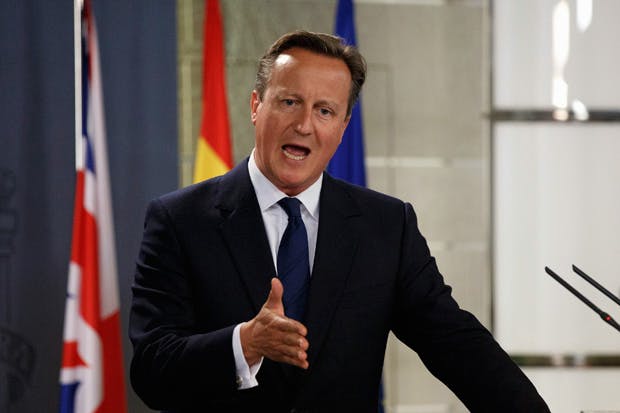David Cameron might not be remembered as the best prime minister in modern British history but he will probably be remembered as the luckiest. Jeremy Corbyn’s election as leader of the Labour party is proving worse — or, for the Tories, better — than anyone could have imagined. His wrecking ball is busy destroying everything that was built by Labour’s modernisers. He does not lack authenticity, belief and passion — but his beliefs are ones which would be more at home in a 1920s plenary meeting of the Moscow Soviet than in contemporary British living rooms.
The Chancellor sees Corbyn’s leadership as a chance to further blacken Labour’s name. The Prime Minister, for his part, released a statement informing voters that Labour ‘is now a threat to our national security, our economic security and your family’s security.’
But now is not the time to bash Labour. Now is the time to make a full, comprehensive and open offer to wavering Labour voters. If Marks & Spencer were to suffer a crisis, its rivals would try to steal its customers rather than releasing ads saying that M&S was always rubbish. If a newspaper folds, others lose no time in trying their hardest to pick up any stray readers. So where are the Tory efforts to appeal to the many Labour voters? Many on the left will be inclined to resign now, for the reasons that Nick Cohen outlines.
Midway through the election campaign, Lynton Crosby intervened to stop Tory candidates attacking Liberal Democrat MPs. It was time to make overtures to Lib Dem voters, he thought. Tory activists were told to forget how much they personally dislike Vince Cable and instead be nice about him, and explain why Conservatism is the better option. His seat fell to the Tories, along with the seats of 26 other Lib Dem MPs. The love-bombing worked.
The same tactic can be applied now to Labour. Polls show that at least half of Labour voters hold views that appal Jeremy Corbyn: they support the welfare cap, which he wants to abolish, they want to relax the top rate of tax. Two thirds of them are prepared to sing the national anthem, which Corbyn wasn’t when he attended a Battle of Britain anniversary service. As a republican, he says he cannot sing ‘God Save the Queen’ with good conscience. He may be applauded for this in Islington but not by wider Labour party members. Such incidents stick in the mind more than any policy: it is 34 years since Michael Foot wore what looked like a donkey jacket on Remembrance Sunday at the Cenotaph, and that is not forgotten.
So if Labour voters take a second look at the Tories, what should they see? This question ought to dominate the preparations for the Conservative party conference next month. The Prime Minister can talk about how inequality and child poverty have both fallen under his time in Downing Street. Rather than be a ‘poverty denier’, as Corbyn absurdly claims, Cameron wants to improve the ways governments approach the issue. He is pushing through reforms that will tackle drug dependence, personal debt, educational failure and the other curses which stymie life chances. The Conservatives are the only party keen to recognise — and confront — poverty in all its dimensions.
Theresa May, the Home Secretary, should discuss the progress she has made in combating modern slavery, and her attempts to prevent the police from unfairly stopping and searching ethnic minorities.
Nicky Morgan, the Education Secretary, should talk about her party’s unrivalled faith in teachers: only the Tories trust them enough to let them set up their own schools, to free them from interference from local authority bureaucrats. She should make the point that the government has made plenty of progress in education. The results, in the free schools and academies, are nothing short of extraordinary.
Sajid Javid, the Business Secretary, should try to overcome his love of technical details and talk about the social dividends brought about by the jobs miracle. Cutting taxes for business is an end in itself, because money not confiscated by the government always helps society — through lower prices, higher wages or more jobs. Inflation is now at zero, employment stands at a record high and wages are growing at their fastest rate in six years. This, Javid should say, is the mission of today’s pro-business Conservatives: not to enrich the already well-off but to enrich society.
The Tories don’t need to move left or change their policies; they already have a stunning array of social achievements. They just need to learn to talk about these, and to express the essential optimism and faith in society that has always been the Conservative message.
Some time ago Sir Keith Joseph contrasted the ‘middle ground’ of Westminster politics with the ‘common ground’ that a political party shares with its voters. As Labour continues its self-immolation, the Tories must now fight for this common ground and seek to claim it for a generation.
Got something to add? Join the discussion and comment below.
Get 10 issues for just $10
Subscribe to The Spectator Australia today for the next 10 magazine issues, plus full online access, for just $10.














Comments
Don't miss out
Join the conversation with other Spectator Australia readers. Subscribe to leave a comment.
SUBSCRIBEAlready a subscriber? Log in